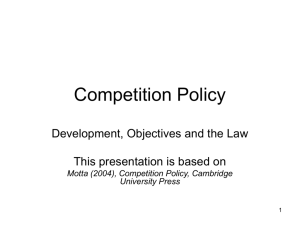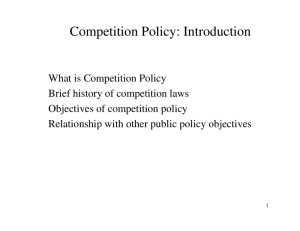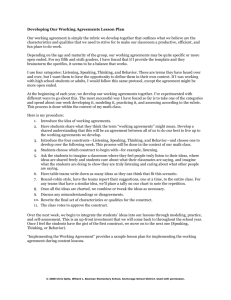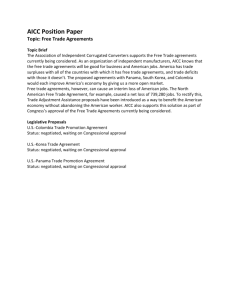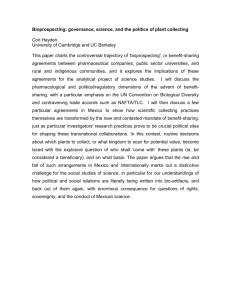COMPETITION LAW
advertisement
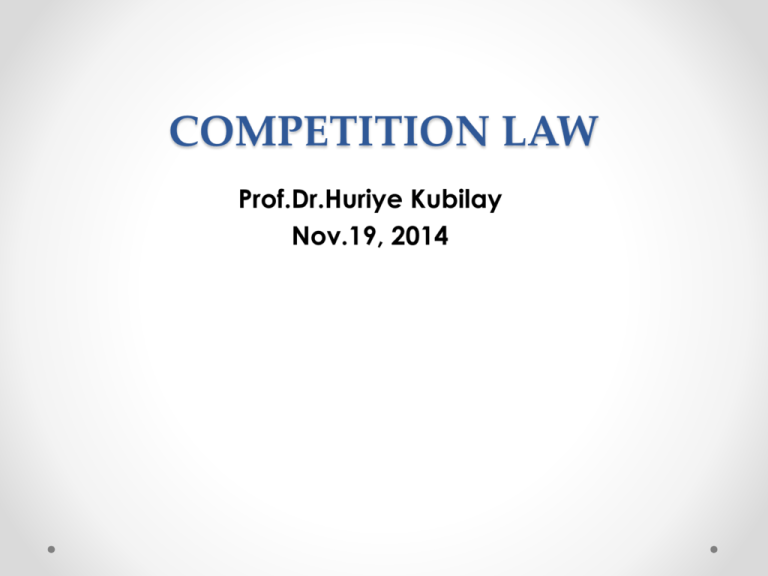
COMPETITION LAW Prof.Dr.Huriye Kubilay Nov.19, 2014 DEFINITION • Competition may be defined as a situation in which someone is trying to win something or be more successful than someone else. • Competition: The contest between undertakings in markets for goods and services, which enables them to take economic decisions freely, • Goods: Any kind of movable or immovable property which is the subject of trade, Services: Physical, intellectual or combined activities carried out in return for a cost or interest, • Unfair Competition Laws are designed to protect consumers and businesses alike against deceptive business practices. Some common examples of unfair competitive practices in commercial law include: trademark infringements, trade defamation, and misappropriation of business trade secrets. As pertains to consumers, unfair competition laws usually prevent unfair pricing strategies, like gouging, and false or misleading representations. • Undertaking: In competition law, undertaking refers to natural and legal persons who produce, market and sell goods or services in the market, and units which can decide independently and do constitute an economic whole. This definition's concept of undertaking is based on "economic activity," "independence," and "economic integration," and is not dependent on legal nature; as such it is distinct from the concept of undertaking as used in other legislation, which can be substituted for the concepts of firms, company or business. Within this framework, for instance private and public companies as well as self-employed persons who can take decisions concerning their economic activities independently are regarded as undertakings in competition law, while a firm whose every decision on economic activities is taken by the holding it is affiliated to, a doctor or an advocate working for a company or an institution according to a service (employment) contract do not constitute an undertaking. • Association of undertakings: Refers to all kinds of associations with or without a legal personality, which are formed by undertakings to accomplish particular goals. Typical examples of associations of undertakings are associations where undertakings are represented by natural persons. Similarly, chambers of industry and commerce, professional chambers, unions and bars are regarded as associations of undertakings. • According to Article 195 (5), TCC, ascendant/dominant undertaking (holding company) is deemed merchant. http://www.inal-law.com/pdf/Inal- Memo%20on%20Group%20Companies%20under%20New%20TCC.pdf • • The new Turkish Commercial Code No. 6102 (“NTCC”), which came into force on 1 July 2012, contains a whole new section of nearly 25 articles on group companies that was not present in the former code. As it is further elaborated below, the relevant provisions on group companies will certainly affect multinational companies that have a subsidiary or an affiliated company in Turkey. While some of the provisions impose significant obligations on parent companies, the main purpose for providing for this matter under the new code is to achieve a certain level of transparency and justice by regulating the relationship between parent companies. As it is also stated under the rationale for the new code, these new provisions aim to abandon the former approach, which was to hold the board members of a company responsible without considering the instructions provided by the parent company. Thus the new code now recognizes the concept of group companies and considers such a group as a whole. • Agreement: Agreement in competition may be between one or more undertakings which operate at the same level of the market, i.e. between competing undertakings, or between undertakings which operate at different levels of the production/distribution chains, i.e. between undertakings in a vertical relationship. • In terms of competition legislation, in light of the explanations above, for instance a cartel agreement where competing undertakings agree to fix prices for the relevant product or service will restrict competition; on the other hand agreements signed between suppliers and their dealers in which suppliers place obligations on the dealers may also restrict competition and therefore fall within the jurisdiction of competition rules. • In terms of competition law, there is no distinction between situations where agreements are concluded orally and where they are concluded in writing. The important point for the existence of the agreement is whether the explicit or implicit union of will or behavior between the undertakings has the prevention, distortion or restriction of competition within the market. • Cartel: Cartels, which are seen as the form of violation that is most damaging for social welfare, refer to explicit or implicit agreements or unions created among undertakings in a particular market for goods and services in order to lessen or restrict competition in that market. Cartel agreements generally concern prices of the product, volume of the products to be supplied, market shares and the territories where the products will be sold and they are typically formed under the name of "gentlemen's agreement" in the present day. • Exemption: Under competition law some agreements may have competition limiting effects, but may also lead to larger social benefits than the social harm caused by these effects. In order to ensure that such agreements may be concluded and the consequent net competitive benefit expected from them may be gained, competition acts also include rules that exempt such agreements from the prohibitive provisions aimed at anti-competitive agreements. • • • • • In the Act no 4054 on the Protection of Competition (Act no 4054), article 5 includes the regulation which exempts an agreement falling under the scope of article 4 of the Act from the prohibition, related invalidity and fine sanctions. Within this framework, those agreements which fulfill all of the requirements listed in Article 5 of the Act no 4054 are granted exemption from the prohibition of article 4 of the Act. The four requirements specified in Article 5, all of which have to be satisfied for an agreement to be granted exemption are as follows: a) Ensuring new developments and improvements, or economic or technical development in the production or distribution of goods and in the provision of services, b) Benefitting the consumer from the above-mentioned, c) Not eliminating competition in a significant part of the relevant market, d) Not limiting competition more than what is compulsory for achieving the goals set out in sub-paragraphs (a) and (b). • Mergers and Acquisitions: Merger in its general definition means the joining of two firms into a new or existing undertaking. In this process companies joining an existing undertaking lose their legal personalities. For mergers under a new company, all of the undertakings parties to the merger lose their legal personalities. Acquisition, on the other hand, refers to an undertaking acquiring property so as to gain the right to control on the whole or a part of another undertaking. In contrast to mergers, in acquisitions undertakings do not necessarily lose their legal personalities. Conditions leading to a transfer of an undertaking’s control to another undertaking are accepted as acquisition • Joint ventures which fulfill all of the functions of an independent economic entity and which involve the exercise of joint control for taking strategic decisions may also be assessed under the scope of mergers/acquisitions. • In accordance with Article 7 of the Act no 4054 and the Communiqué Concerning the Mergers and Acquisitions Calling for the Authorization of the Competition Board, No: 2010/4 (Communiqué no 2010/4) issued in order to establish the principles and procedures for the application of this article requires that mergers and acquisitions which lead to permanent changes in the control and which exceed certain turnover thresholds be notified to the Competition Board in order become legally valid. • Dominant position: In competition law, dominant position reefers to the power of one or more undertakings in a particular market to determine economic parameters such as price, supply and the amount of production and distribution, by acting independently of their competitors and customers. • Negative Clearance: Negative clearance refers to the fact that Competition Board may, upon the application of the undertaking or associations of undertakings concerned, establish that an agreement, decision, practice or merger and acquisition are in violation of articles 4, 6 and 7 of the Act No. 4054. As a result of the examination for negative clearance, applicant undertaking or association of undertaking may be granted a negative clearance certificate, indicating that an agreement, decision, practice or merger and acquisition, which are the subject of the application, are not contrary to articles 4, 6 and 7 of the Act. Agreements lımıtıng cartels • CARTELS Cartel is the common concept which refers to anti-competitive agreements and/or concerted practices among competitors including price fixing, market allocation, restriction of supply or imposing quotas and collusive bidding in tenders. Cartels, which are accepted as the most severe competition restriction, strive to increase their profits by controlling different market related variables including, especially, price and quantity. • Agreement among competing undertakings to determine competitive parameters in the market leads to the disfunctioning of the market mechanism whose efficient functioning maximizes consumer welfare, and thus to prices artificially settling above competitive equilibrium. Such an agreement reduces the pressure on undertakings to produce cheaper, better quality or new products in order to reach more consumers and condemns consumers to higher prices and lower quality products. At the same time, cartels lead to negative effects on the fight with inflation and on the equality of income distribution. Hence, cartels have been described as the “cancer of market economy”, and it has also been stated that “no economy that has no effective and deterrent sanctions against cartels can be claimed to be a free economy.” • Due to the severe damage they do to economy, there is a world-wide consensus among competition authorities that cartels should be treated differently than other practices restricting competition and should be punished in the most severe manner. The most common type of sanction used in this struggle is fines. Many countries apply severe fines to deter the formation of cartels. However, the fight against cartels is not limited to fines imposed on undertakings; administrative fines have also been supported with other sanctions such as fines imposed on executives with decisive roles in the formation of cartels, imposing jail sentence, and loaded damages payments under private law. One of the most effective methods competition authorities utilize in the fight against cartels is “leniency programs”. Through leniency programs, detecting cartels – which by nature operate in secret – is facilitated, and the first undertaking to disclose the cartel and its employees are granted immunity against all penal sanctions. Furthermore, other undertakings and their employees which assist in the cartel investigation avail discounts on their penalties at varying rates. Regulations concerning the leniency program were introduced with the amendments to the Act no 4054 adopted in 2008. Within this framework, the Regulation on Active Cooperation for Detecting Cartels (Leniency Regulation) and the Regulation on Fines to Apply in Cases of Agreements, Concerted Practices and Decisions Limiting Competition, and Abuse of Dominant Position (Regulation on Fines) concerning the detection of cartels were put into force as of February 15, 2009. Agreements between competitors • Agreements signed between competitors in order to facilitate specialization in any operation such as production, distribution or marketing, or to conduct technology transfer or joint R&D studies may lead to cooperation between the parties and create competition restricting effects such as taking joint commercial decisions or hindering the operations of third party undertakings. However, such agreements may also have efficiency creating characteristics. Vertical agreements • Vertical agreements which are signed between undertakings at different levels of the production and distribution chain in order to procure, sell or resell goods may have competition-restricting effects due to some obligations brought by the parties on each other. One of these obligations is the obligation not to sell competing goods, placed by the supplier on the buyer which distributes the goods. This and similar obligations may have effects such as creating market power for the parties to the agreement and to hindering the operations of third-party undertakings. On the other hand, vertical agreements may also have pro-competitive effects, especially on the basis of the efficiencies they create in distribution.When conducting competition law assessment in relation to these agreements which may have pro-competitive effects in addition to their competition limiting aspects and which may basically be addressed under the above-mentioned two headings, the agreements are analyzed in terms of their anti-competitive and pro-competitive effects and those agreements which lead to net competitive benefits may be granted exemption from the prohibition of article 4 of the Act no 4054, under the block or individual exemption regime. • The block exemption regime is regulated with the Block Exemption Communiqué on Vertical Agreements, no 2002/2 (Communiqué No: 2002/2), and the application principles for the Communiqué no 2002/2 are explained in the Guidelines on Vertical Agreements. • In case vertical agreements which are assessed under article 4 as a result of their competition restricting effects do not fall under the scope of the block exemption, they are subjected to an exemption examination under article 5 of the Act no 4054 and are analyzed in terms of their benefits and harms. At this point, it must be noted that there is no notification obligation for such agreements, which means exemption assessment must primarily be conducted by undertakings and association of undertakings. When conducting exemption assessments, undertakings and associations of undertakings should take block exemption communiqués, guidelines explaining these communiqués and previous decisions of the Board into consideration, in addition to the requirements listed in article 5. Dealership Agreements • Dealership Agreements are one of the types of vertical agreements made among undertakings at different levels of the production/service chain for the purposes of resale of goods. In dealership agreements, one party is the supplier of the goods or services and the other party is the buying undertaking which is the reseller of that product. Dealership agreements are considered under article 4 of the Act no 4054 in case they include competition limiting effects. In such agreements, generally supplier places certain place obligations on the buyer, such as an obligation not to sell competing products or not to sell outside of an allocated region. Such dealership agreements are addressed under article 4 of the Act no 4054, but they can be granted exemption if they meet certain requirements. • There are two block exemptions related to dealership agreements:Block Exemption Communiqué on Vertical Agreements, no 2002/2 (Communiqué No: 2002/2) describes, for all sectors, which requirements must be met in order for dealership agreements to be granted exemption from the application of article 4. Application principles for the Communiqué no 2002/2 are explained in detail in the Guidelines on Vertical Agreements. • In addition, Block Exemption Communiqué on Vertical Agreements and Concerted Practices in the Motor Vehicle Sector, no 2005/4 (Communiqué No: 2005/4) is issued for dealership agreements concluded in the motor vehicle sector. Application principles for the Communiqué no 2005/4 are explained in detail in the Guidelines on the Explanation of the Block Exemption Communiqué on Vertical Agreements and Concerted Practices in the Motor Vehicle Sector.As in other types vertical agreements, dealership agreements which do not fall under the scope of the block exemption may be subjected to individual exemption assessment under article 5 of the Act no 4054. Reasoned Board Decisions • Hearing for the Investigation concerning Twelve Banks Operating • Date: 08.03.2013, Nu.13-13/198-100 • The investigation conducted in order to determine whether twelve banks operating in Turkey violated article 4 of the Act no 4054 on the Protection of Competition by making agreements and/or engaging in concerted practices in the deposits, loans and credit cards sector was concluded. • As a result of the discussion of the file by the Competition Board, it was determined that article 4 of the Act no 4054 on the Protection of Competition was violated in the deposits, loans and credit cards sector. • It can be appealed before Ankara AdministrativeCourts KONYA Association of Goldsmiths and Jewelers • The İnvestigation conducted in order to determine whether Konya Association of Goldsmiths and Jewelers (Association) violated article 4 of the Act no 4054 on the Protection of Competition by fixing sale and repair prices for gold wares and jewelry and by introducing restriction on sales/marketing activities such as advertisements and promotions has been concluded. • The investigation was initiated as a result of the preliminary inquiry opened in response to the application claiming that businesses were prevented from making sales at prices below those determined by the Association and fines were imposed on businesses selling at low prices. During the investigation phase, it was examined whether the Association fixed sales and repair prices for gold as well as sale and marketing conditions outside of the market. • As a result of the examination of the file by the Competition Board on 14.02.2013, it was unanimously decided that the Association violated article 4 of the Act no 4054 by fixing purchase, sale and repair prices for gold as well as elements of economic and commercial activity such as sale and marketing terms outside of the market, and that an administrative fine of TL 7,215.47 should be imposed on the Association in accordance with article 16 of the same Act and the "Regulation on Fines to Apply in Cases of Agreements, Concerted Practices and Decisions Limiting Competition, and Abuse of Dominant Position." • Control Criteria Article 195 of the NTCC provides a definition for controlling companies and affiliates and the criteria for determining the extent of control as follows. 1. In the event that a company, whether directly or indirectly: (a) holds the majority of the voting rights or (b) is entitled to procure the appointment of board members constituting the majority who are able to take decisions in the management body in accordance with the articles of association of the company, (c) holds the majority of the voting rights, either by itself or together with other shareholders or partners, apart from its own voting rights relying upon an agreement, or 2. In the event that a company is able to keep another company under its control pursuant to an agreement or otherwise (e.g. mergers, demergers, share acquisitions, etc.) the first company will be deemed as the controlling company and the second company will be deemed as the affiliate. Trademark Infringement • One common form of unfair competition is a violation of the exclusive rights attached to a trademark without the permission of the trademark owner. Infringement may take place when one party, the "infringer," uses a trademark which is indistinguishable or astonishingly similar to a trademark owned by another party, in relation to products or services which are identical or similar to the products or services which the registration covers. Trade Defamation • Trade defamation is an intentional, false communication, either written or spoken, that harms a business/person's reputation. This false communication must decrease the respect, regard, or confidence in which the business or person is held, or induce disparaging, hostile, or disagreeable opinions or feelings against the business or person. While most trade defamation is a civil matter, in a few instances it can become criminal. Trade defamation can also include both written statements, known as libel, and spoken statements, called slander. COMPETITION LAW • Competition law is a law that promotes or seeks to maintain market competition by regulating anti competitive conduct by companies Competition law is implemented through public and private enforcement. • Competition law is known as antitrust law in the US and antimonopoly law in China and Russia. In previous years it has been known as trade practices law in the United Kingdom and Australia. • The history of competition law reaches back to the Roman Empire. The business practices of market traders, guilds and governments have always been subject to scrutiny, and sometimes severe sanctions. Since the 20th century, competition law has become global. The two largest and most influential systems of competition regulation are US Antitrust Law and European Union Competition Law. National and regional competition authorities across the world have formed international support and enforcement networks. • Modern competition law has historically evolved on a country level to promote and maintain fair competition in markets principally within the territorial boundaries of nation states. National competition law usually does not cover activity beyond territorial borders unless it has significant effects at nation-state level. Countries may allow for extraterritorial jurisdiction in competition cases based on so-called effects doctrine. The protection of international competition is governed by international competition agreements. • In 1945, during the negotiations preceding the adoption of the General Agreement on Tariffs and Trade (GATT) in 1947, limited international competition obligations were proposed within the Charter for an International Trade Organisation. These obligations were not included in GATT, but in 1994, with the conclusion of the Uruguay Round of GATT Multilateral Negotiations, the World Trade Organisation (WTO) was created. The Agreement Establishing the WTO included a range of limited provisions on various cross-border competition issues on a sector specific basis. Competition law, or antitrust law, has three main elements: • prohibiting agreements or practices that restrict free trading and competition between business. This includes in particular the repression of free trade caused by cartels. • banning abusive behavior by a firm dominating a market, or anti-competitive practices that tend to lead to such a dominant position. Practices controlled in this way may include predatory prices, tying, price gouging, refusal to deal, and many others. • supervising the mergers and acquisiations of large corporations, including some joint ventures. Transactions that are considered to threaten the competitive process can be prohibited altogether, or approved subject to "remedies" such as an obligation to divest part of the merged business or to offer licenses or access to facilities to enable other businesses to continue competing. • Substance and practice of competition law varies from jurisdiction to jurisdiction. Protecting the interests of consumers (consumer welfare) and ensuring that entrepreneurs have an opportunity to compete in the market economy are often treated as important objectives. Competition law is closely connected with law on deregulation of access to markets, state aids and subsidies, the privatization of state owned assets and the establishment of independent sector regulators, among other market-oriented supply-side policies. In recent decades, competition law has been viewed as a way to provide better public services. LEGISLATION TURKISH CODE OF OBLIGATIONS • Art. 57 of TCO regulates unfair competition as a special type of tort for non commercial matters. • Art. 57 of TCO is based on principle of the protection of economic personality. Therefore, it is considered as an adaptation of the principle on the «protection of personality» stated in Art. 23 and others in Turkish Civil Code. TURKISH COMMERCIAL CODE • The Concept of Unfair Competition The concept of unfair competition has been reshaped by the new Turkish Commercial Code (the TCC). The TCC defines “unfair competition” as (i) any misleading act or commercial practice that has an impact on competitors or on relations between customers and suppliers and (ii) any act or commercial practice that violates the bona fide principles. • The TCC also sets out the purpose of the unfair competition provisions, which is to provide a fair and uncorrupted competition environment for the interest of all, including competitors and customers. • The TCC provides a list of six “major unfair competition cases”. However, valid unfair competition cases are not limited to those in this list. Accordingly, other acts or commercial practices may also be deemed to constitute unfair competition depending on the particulars of the case. • The six cases include: (i) unfair advertisement and unfair sale methods; (ii) soliciting customers/employees/attorneys/ other associates to breach or terminate agreements; (iii) unlawfully benefiting from products of third parties; (iv) disclosure of business secrets; (v) violation of business codes and ethics; and (vi) Use of general contract terms that are substantially different from the applicable legislation or that impose materially unfair contractual obligations, or generally violating the concept of good faith. Examples of unfair competition under each of the cases (a)Advertisement and sale methods in breach of bona fide principles and other unjustified acts (i) degrading others’ business, products, prices and activities with false and misleading declarations; (ii) providing false and misleading statements about its own business, business enterprise, logos, assets, products, sale campaigns, prices, stocks, and business relationships or activities or providing a benefit to third parties through similar practices; (iii) creating a false impression of having honours, diplomas, awards or exceptional talent; or using false titles or symbols for this purpose; • (iv) deliberately creating confusion with a competitors’ business, products or works; • (v) comparing one’s own business products or prices with others in a false, misleading, or discrediting way or providing a benefit to third parties through similar practices; • (vi) misleading customers by sale of certain products for prices lower than their supply prices on more than one occasion and highlighting these in advertisements; • (vii) misleading customers about the actual value of the product by way of offering additional benefits; • (viii) restricting the freedom of customers using aggressive sale tactics; • (ix) misleading customers about the specifications, qualifications, or benefits of a product or concealing the risk of one’s products or activities; • (x) for sales with instalments and any similar transactions subject to public advertisements, the failure to clearly indicate the trade name, total price/cost, and any additional costs arising from sales with instalments; • (xi) for advertisements regarding consumer credit, the failure to indicate the trade name, net costs of credit, total costs, and effective annual interest rate; • (xii) for those who offer/execute sales with instalments and consumer credit contracts, using contracts that contain false or missing information on the subject, price, payment terms, contract term, and early termination rights of the customer; (b) Soliciting customers to breach or terminate an agreement • (i) leading customers to breach an existing contract in order to be able to execute a contract with the concerned customer; • (ii) trying to gain benefit for one’s own or for third parties by providing/proposing unfair benefits to the employees, attorneys or other associates of third parties which may lead them to breach their existing obligations; • (iii) leading employees, attorneys or other associates to disclose confidential information about a competitor’s production or business; and • (iv) leading customers to cancel or to terminate sale contracts or sale with instalment contracts or consumer credit agreements in order to sign similar contracts with the concerned customers. (c) Unlawfully benefitting from products of a third party • (i) benefiting unlawfully from business products such as offers, calculations or plans that are deposited as escrow; • (ii) benefiting unlawfully from business products such as offers, calculations or plans that belong to third parties despite the fact that it is known that they have been obtained and transferred unlawfully; and • (iii) benefiting from others’ products, which are ready to market, by way of technical duplication methods. • (d) Unlawful disclosure of confidential information • (e) Violating the business code of conduct (ie. business ethics and rules) (f) Using general contract terms in breach of good faith rules, in particular unfair to the counter-party in a misleading manner • Using pre-prepared general contract terms which: • (i) directly or through interpretation materially diverge from the applicable rules, or • (ii) include rights and obligations that are materially indifferent to the nature of the concerned agreement. Consequences of Unfair Competition • The TCC sets forth legal and criminal procedures that may arise from unfair competition cases. (a) Civil actions (b) Criminal liability (a) Civil actions • In the event it is determined that an act constitutes unfair competition, the potential legal actions that may be taken are as follows: • (i) Declaratory judgment action (concerning the examination and declaration of the acts constituting unfair competition); • (ii) Action for the prevention of an unfair act by demanding the suspension of the unfair competition; • (iii) Action for restitution demanding the elimination of the unlawful consequences of the unfair competition; • (iv) Action for compensation of damages (the judge may rule that the defendant’s potential gain from the act of unfair competition act is to be provided as compensation to the claimant); and • (v) Claims for moral compensation in certain cases. • These actions may be brought before the court by those who suffer or are likely to suffer loss of reputation, business, customers or any financial benefit as a result of the unfair competition. In certain cases, customers who suffer or are likely to suffer financial damages are also allowed to initiate the above-mentioned lawsuits. Further, in some cases, chambers of commerce and industry and similar organizations may be allowed to initiate some of the actions mentioned above. • The above-mentioned lawsuits are subject to a statute of limitations of one year following the date when the party becomes aware that he is entitled to take legal action and in any case three years following the occurrence of the unfair competition act. In the event that an unfair competition act is also considered a “crime” under the Turkish Penal Code, the statute of limitations in either the Turkish Penal Code or the TCC, (whichever is longer), shall be applicable to the legal actions as well. Criminal liability • Under the TCC, those who: • (i) intentionally commit above-mentioned acts of unfair competition, • (ii) intentionally provide false or misleading information regarding one’s personal status, products, business products, commercial and other activities in order for one’s offers and proposals be given preference above competitors, • (iii) entice employees, officers or other workers to reveal their employers’ or clients’ production or commercial secrets, or (iv) have not prevented a punishable act of unfair competition conducted by their employees, workers or representatives, and/or have not restored the action of the misrepresentation, may be punished by two years of imprisonment, or subject to an administrative fine, accordingly. • If the unfair competition act is committed by a legal entity, the penal clauses shall also apply to members of management or shareholders who have or should have acted on behalf of the concerned entity. • The parties who are entitled to file a criminal complaint are those who suffer or are likely to suffer loss of reputation, business, customers or any financial benefit as a result of unfair competition. In certain cases, customers who suffer or likely to suffer financial damages are also allowed to file criminal lawsuits. THE ACT ON THE PROTECTION OF COMPETITION • Act No: 4054 Date of Adoption: 7/12/1994 Official Gazette of Its Publication: Date: 13/12/1994 Number: 22140 • Purpose : Article 1- The purpose of this Act is to prevent agreements, decisions and practices preventing, distorting or restricting competition in markets for goods and services, and the abuse of dominance by the undertakings dominant in the market, and to ensure the protection of competition by performing the necessary regulations and supervisions to this end. Scope • Article 2- Agreements, decisions and practices which prevent, distort or restrict competition between any undertakings operating in or affecting markets for goods and services within the boundaries of the Republic of Turkey, and the abuse of dominance by the undertakings dominant in the market, and any kind of legal transactions and behaviour having the nature of mergers and acquisitions which shall decrease competition to a significant extent, and transactions related to the measures, establishments, regulations and supervisions aimed at the protection of competition fall under this Act. Prohibited Activities • Agreements, Concerted Practices and Decisions Limiting Competition Article 4- Agreements and concerted practices between undertakings, and decisions and practices of associations of undertakings which have as their object or effect or likely effect the prevention, distortion or restriction of competition directly or indirectly in a particular market for goods or services are illegal and prohibited. Such cases are, in particular, as follows: • Fixing the purchase or sale price of goods or services, elements such as cost and profit which form the price, and any terms of purchase or sale, • Partitioning markets for goods or services, and sharing or controlling all kinds of market resources or elements, • Controlling the amount of supply or demand in relation to goods or services, or determining them outside the market, • Complicating and restricting the activities of competing undertakings, or excluding undertakings operating in the market by boycotts or other behaviour, or preventing potential new entrants to the market, • Except exclusive dealing, applying different terms to persons with equal status for equal rights, obligations and acts, • Contrary to the nature of the agreement or commercial usages, obliging to purchase other goods or services together with a good or service, or tying a good or service demanded by purchasers acting as intermediary undertakings to the condition of displaying another good or service by the purchaser, or putting forward terms as to the resupply of a good or service supplied. • Private Law Consequences of Limiting Competition Legal Nature of Agreements and Decisions Contrary to This Act Article 56- Any agreements, and decisions of associations of undertakings, contrary to Article 4 of this Act are invalid. The performance of acts arising out of such agreements and decisions may not be requested. • Right to Compensation Article 57- Anyone who prevents, distorts or restricts competition via practices, decisions, contracts or agreements contrary to this Act, or abuses his dominant position in a particular market for goods or services, is obliged to compensate for any damages of the injured. If the damage has resulted from the behaviour of more than one people, they are responsible for the damage jointly. Competition Authority • Article 20- The Competition Authority having a public legal personality, and an administrative and financial autonomy is established in order to ensure the formation and development of markets for goods and services in a free and sound competitive environment, to observe the implementation of this Act, and to fulfill the duties assigned to it by the Act. • Article 21- The organization of the Authority consists of the a) Competition Board, b) Presidency, c) Service Units. • An action may be brought at the authorised administrative court against the administrative sanction decisions of the Competition Authority.
